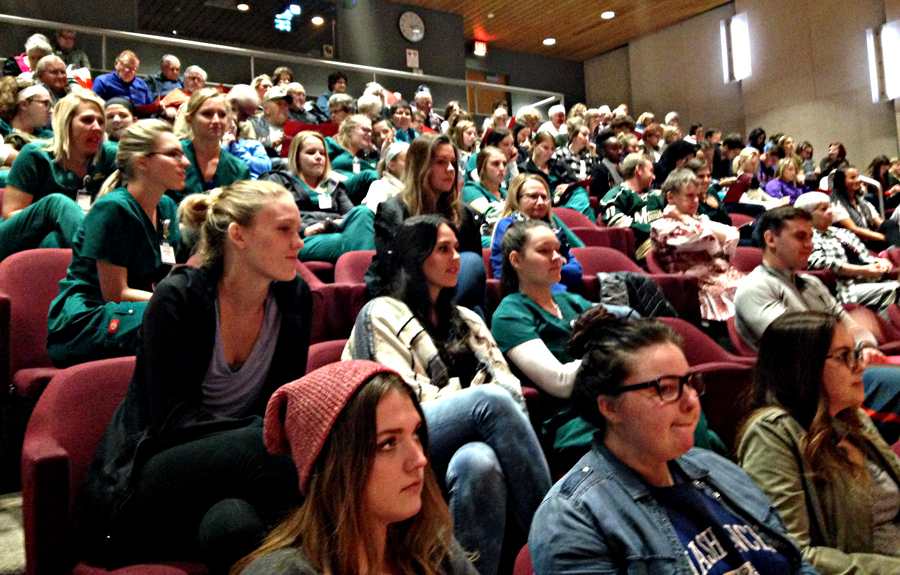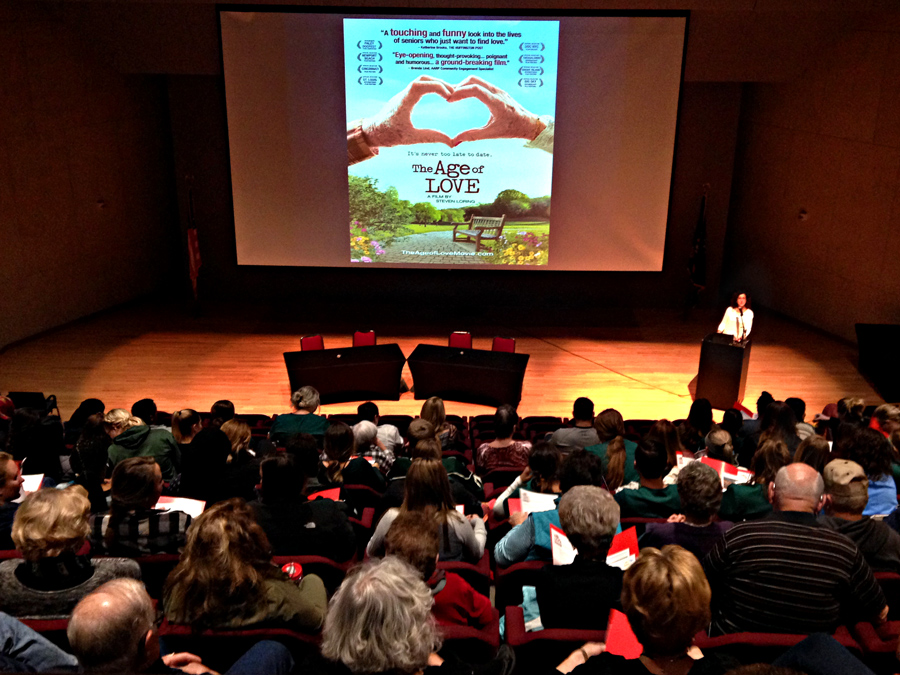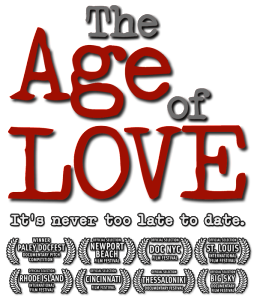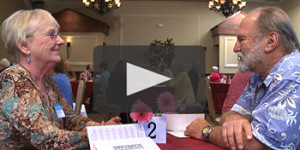Educational Licensing
THE FILM HUMANIZES AGING IN AN UNPRECEDENTED WAY. It flies in the face of our culture's rampant ageism...and lets viewers genuinely experience the truth that love and companionship transcend age. — Kavan Peterson, ChangingAging.org
A TRANSFORMATIVE TOOL...TAKES STUDENTS FAR BEYOND BOOK KNOWLEDGE in understanding older adults' desire and need for companionship, love and sexuality. — Dawn Norris, Prof. Sociology, Univ. of Wisconsin–La Crosse
The Age of Love follows the real-life adventures of 30 seniors who sign up for a speed dating event for 70- to 90-year-olds, each seeking one more chance at connection and love.
By revealing typically-overlooked elders as vital and emotionally intricate individuals, the film shatters ageist stereotypes, explores how our core emotional needs endure and presents an unexpected story of possibility and growth in later life.
The film offers educators in Sociology, Aging and Human Development, Social Work, Psychology, Nursing, Health Care Admin and more an innovative tool that brings intimate attitudes and behaviors of our older population to life.
By screening The Age of Love you can:
- engage multi-generational audiences with a relatable story on aging and connection that gives voice to elders seeking to fulfill emotional needs familiar to any age group
- launch essential discussions and inspire student reflections on ageism, stereotypes, gender and the innate and social challenges we all face as we grow older
- connect classrooms with the elder community by organizing a local senior dating/friendship event as a service learning project where students learn from and empower older adults to reach out and reconnect (Senior Speed Dating Event Kit and Lesson Plan included)
We look forward to your partnership in utilizing The Age of Love as a unique teaching tool, opening students' minds to the true voices of older adults seeking new intimacy, emotional growth and companionship.
 "Highly recommended for University Libraries."
"Highly recommended for University Libraries." "Especially beneficial to college students studying contemporary issues with aging."
"Especially beneficial to college students studying contemporary issues with aging."NEWS FROM OUR PARTNERS: • US News & World Report and WKBT News were among numerous news outlets reporting on a community-wide senior speed dating event organized as a service learning project by Dawn Norris’s graduate sociology class at the University of Wisconsin-La Crosse.
• Journal of Social Work Education published "Speed Dating With Older Adults: Reducing Ageism in Social Work Students" by Dana Branson of Southeast Missouri State Univ. Using The Age of Love and our event materials, Branson found this "innovative opportunity" decreased ageism and negative stereotypes of older adults in students, while "increasing their interest and comfort for working in gerontological settings."

The Age of Love screening at North Dakota State University, School of Nursing
EDUCATIONAL LICENSE OPTIONS:
1) Library/Classroom DVD – $325
2) Library/Classroom DVD + Digital Streaming License (perpetuity), MP4 provided or your digitization, utilizing your secure streaming server – $525
3) Add a Screening open to the Public or an Educational Conference Screening to License Options 1-2 – $125
4) Single Classroom Screening, provided through a streaming link – $100 (for this option, please fill out this form, rather than the Edu Licensing form below).
35-page Discussion and Screening Guide included. A Q&A with the Filmmaker - either in person or virtual - is also easy to arrange.
Go To Educational License Order Form
Download 2025 Educational Brochure
Once your application is submitted, you'll be sent a Licensing Agreement and Invoice, payable by check or credit card (via PayPal).
If you have additional questions, please contact us using this form, or reach our team at: info (at) theAgeofLoveMovie.com.
THE GERONTOLOGIST 56 (4): 784-785REVIEW EXCERPT, THE AGE OF LOVE
The elders [in The Age of Love] are open, brave, and vulnerable. Loring captures the marked differences among these older men and women. He succeeds in revealing their shared need to reach out for something missing in their lives that might be provided by another person, be it a dream, a soulmate, adventure, love, companionship, validation of worth, or the immediacy of “seize the day.”
Though the film offers moments of humor and lighthearted fun, it also holds more serious lessons about the many meanings of intimacy and love in the later years. Foremost, it helps those who are younger to appreciate the questions posed at the outset regarding their possible future status as lone survivors.
Though we are sustained by our previous relations, The Age of Love demonstrates that a significant part of healthful aging—for those who are able—involves forming new commitments, embracing intimacy once again. It tells us that memories of the heart are of many kinds.
— Rick J. Scheidt, PhD School of Family Studies and Human ServicesKansas State University
WHAT INSTRUCTORS ARE SAYING
The Age of Love is a moving and important film, that shows the importance of love, of desire, of companionship for people of all ages. It opened the eyes of my students regarding the meaning of love and intimacy at different phases of life. This film challenges the dominant notion that aging is equated with decline and instead shows the commonality and stability of emotional needs and desires throughout our lives. It is a perfect film for college classes in sociology, psychology, aging, human development and family studies, as well as other social science and health services fields as it offers a highly relatable introduction to the aging mind and heart.—Beth Montemurro, Ph.D.Professor of SociologyPenn State University, Abington
There is so much in The Age of Love about what intimacy is and what intimacy means for those in later life – dispelling the idea that older adults are not sexual beings while countering ageist attitudes that carry down to how older adults view themselves. The film allows us to witness older people who actively defy our insidious stereotypes about sexuality and aging.— Wendy Kopp Associate Professor of Practice, School of NursingNorth Dakota State University
Student response to The Age of Love has been overwhelmingly positive. Initially attracted by the topic – ‘My grandmother goes speed dating?!’ – students found themselves gaining a much deeper understanding about relationships among older adults and began to think about their own aging process, the value of relationships and what they want for their own lives.— Erica Srinivasan Associate Professor, Developmental PsychologyUniversity of Wisconsin - La Crosse
The Age of Love shows us that love is ageless...that people may age, but their hearts still open for love, companionship and romance. The director shows the courage it takes for people in their 70s and 80s to once again enter the dating marketplace, and we can see them fill up with hope, meet companions and gear up to try again. This is a great film for college students studying relationships and the family, and for professionals who are working with older populations. Too often films ignore the full humanity of older men and women and forget that they can be husbands, wives and lovers. The Age of Love is a wonderful corrective to all those films that deny seniors the full range of who they are and who they can be.— Pepper Schwartz, PhDProfessor of SociologyUniversity of Washington at Seattle
Pursuit of a new relationship in later life often calls for a willingness to abandon comfort and security and to embark on a quest that may challenge us with uncertainties and insecurities we thought we had long left behind.The Age of Love brings to life these feelings of loyalty, fear, search for control amidst uncertainty, acknowledgment of mortality, desire to preserve security, realization that life without companionship can be lonely and more. Through the lens of speed dating, it looks clearly at the issues older adults face while living in a society that is only now beginning to accept and define norms for intimacy in later life.— Carol Podgorski, PhD, M.P.H.Associate Professor of Psychiatry, Institute for the FamilyUniversity of Rochester
From an educational standpoint, I appreciate how the film sparked an engaging classroom discussion about love, intimacy, and sexuality in older age, broadening my students’ perspectives and challenging their preconceived notions and attitudes towards intimacy in later life. The students were able to relate to similar needs, desires, concerns, and insecurities we all have toward love and relationships at any age. This film makes important contributions on the topics of intimacy and relationships and would be a valuable resource in any gerontology course.—April Temple, PhDProfessor of Health SciencesJames Madison University
So many older people in film and TV, social media and in society are depicted as vulnerable, tired, frail and silenced, and we are left feeling sorry for them. The Age of Love showed me how older people dream, they love, they plan, they are strong, they do have a voice and they live like everyone else, just with a few more wrinkles.— Melissa Martin Program Development DirectorPsychiatric Medical Care, Nashville, TN
A crucial conversation in social work looks at ageism, as older people are marginalized by the message that they’re not as valuable or have little to offer. The Age of Love’s characters break these negative stereotypes as they express strength and resilience, presenting strong voices to help students understand critical issues facing older adults in our society.— Sarah Swords Clinical Assistant Professor of Social Work,University of Texas at Austin
WHAT STUDENTS ARE SAYING
From Steve Gurney, Adjunct Professor, Erickson School of Aging StudiesUniversity of Maryland Baltimore County (UMBC)
 The Age of Love has become an important part of my Aging 200: Aging People, Policy and Management course each semester, and I am consistently impressed with how well the film helps me teach topics ranging from Ageism to Isolation. However, one of my favorite reasons for using this film is that it addresses topics that go far beyond the “aging” subject matter and helps the students reflect on love and relationships in ways they never expected. Each semester, I survey students on each of the course elements, and The Age of Love is always at the top of the list as their favorite and the best learning tool in the course. Here are some excerpts from students' personal reflection essays, sharing their perspectives on the film:
The Age of Love has become an important part of my Aging 200: Aging People, Policy and Management course each semester, and I am consistently impressed with how well the film helps me teach topics ranging from Ageism to Isolation. However, one of my favorite reasons for using this film is that it addresses topics that go far beyond the “aging” subject matter and helps the students reflect on love and relationships in ways they never expected. Each semester, I survey students on each of the course elements, and The Age of Love is always at the top of the list as their favorite and the best learning tool in the course. Here are some excerpts from students' personal reflection essays, sharing their perspectives on the film:
The film gives me inspiration and hope for my mother to find love again...I will never think of love as something that can only be found in your youth and dwindles as you age but as a flame that is doused and reignited throughout our lives.
The Age of Love gives an extraordinary insight into the lives of elders...it provides a front row seat into the lives, minds, and emotions of these elders that most people, especially youth, would overlook. It doesn’t only help us understand how they feel but also helps us become more aware of our language and attitude towards elders in this sensitive subject.
The film opened my eyes to an entirely new perspective. I did not think that elderly people are still hoping to find true love, and still feel the same emotions as people my age do when in such situations. I felt very guilty after watching the movie. I realized that age is really just a number, and you are never too old to fall in love.
This movie was much more fascinating than I could have imagined. As I looked around the room, many of my fellow students were captivated by the unfamiliar experience of watching our typical romantic film played out 40 years down the line. The lead actors were not Jennifer Aniston and Ashton Kutcher, but rather, real live senior citizens. This film made me think about how I view my grandparent’s relationship, and it challenged many of the previous views I had about dating amongst senior citizens.
I can relate to the message this documentary is trying to relay because my grandmother died a few years back and I was forced to witness my grandfather lose himself as a person just because he thought that he would never find love again.
Dating and life as a we age have begun to be part of my day-to-day thoughts. I am now much more aware of my misconceptions of our aging society, and what it will be like to date as I age, or what the experience of aging, in general, will be like.
This movie breaks hidden stereotypes on finding love. If an elderly person can go on a date, try different things, and meet new people, so can someone who is in their 20s, 30s, 40s, and 50s. For as long as people are alive and well, it’s wise to utilize the time they have to venture out on new activities.
Watching the video was quite an interesting experience for me because, generally, society views the elderly population as people who need to be taken care of and assisted in almost every aspect of their lives. We fail to realize that they are still like every other person and have needs above what caretakers can offer...including relationships, love, intimacy and even sex.
I was very surprised at the content of the movie. I did not expect older people to still have feelings of love. I also did not expect elders to sign up for speed dating. It made me question the way we view older people. It completely destroyed any stereotypes I thought were true.
After watching the movie, I was thinking it could be really helpful if we held a similar event at UMBC, and we could hold it at the dining hall and put an ad out in the newspaper. I believe this has the potential to be a great event, because we would be doing something great for the community. The fact that even one person could find their true love or someone they can date would be amazing. We could get people to volunteer, and it could be amazing way for us to help the community.
The movie showed me that even when we are older we still want to have someone to love, and we still need the chance to find love. The film is something people our age need to watch to learn something about stereotypes that surround old people. I personally loved the film because it showed me no matter what happens you can always find love, and should never give up because “you are too old.”
The Age of Love was such a unique film in the sense that it provided so many different and interesting viewpoints to a topic that no one really knew existed. The love life of those older is not really something portrayed in our media and when it is, often romanticized to a large degree. Hearing their stories of how their lives led to this moment of just wanting someone to be intimate with was so moving. Life isn’t just about our “prime years” but extends to even old age which has its own profound moments.
PROFESSIONAL CONFERENCE SCREENINGS INCLUDE:
- IAGG/GSA World Congress of Gerontology and Geriatrics
- ASA American Society on Aging ‘Aging in America’ Conference
- AGHE Association for Gerontology in Higher Education
- NISC National Institute of Senior Centers SEEK Conference
- ALCA Aging Life Care Association National Conference
- ASA American Sociological Association Annual Meeting
- CSWE Council on Social Work Conference & Film Festival
- LeadingAge Pennsylvania, Missouri & Leadership Academy
EDUCATOR RESOURCE SHEETS
As professors in various fields have begun utilizing The Age of Love in their classrooms, several have offered to share the following Resource Pages to illustrate how the film supports teaching and inspires students in their discipline. Click on the headers to open and close each page (downloads coming soon!):





